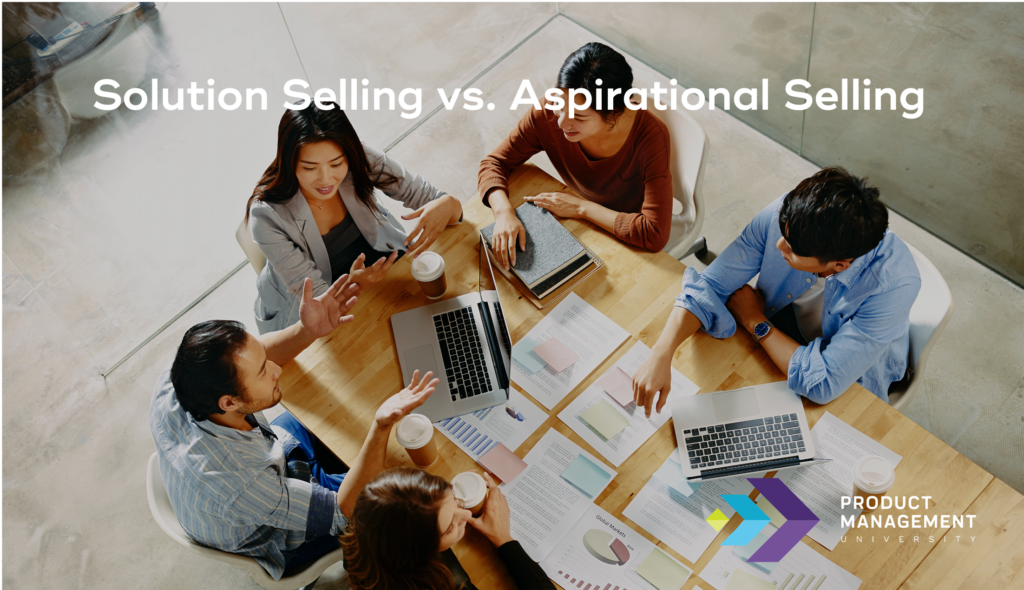Solution Selling vs. Aspirational Selling

Solution selling is like vanilla ice cream. Everyone knows what it is. It’s simple and it meets the most basic criteria for a dessert. Here’s the thing. If you and all of your competitors are serving vanilla ice cream to buyers, you’re missing an enormous opportunity to differentiate and improve your win rates. Aspirational selling is a more tantalizing flavor that separates you from the pack and makes your products the clear choice.
What is Solution Selling?
Solution selling is a basic sales methodology that has long been the norm in enterprise B2B. The formula for solution selling is to articulate customer problems, communicate how your products or services solve those problems, then discuss the benefits. It’s not wrong or bad. In fact, it’s still pretty good. The problem is it’s very tactical and usually not good enough to separate you from the pack when the deal is highly competitive.
What is Aspirational Selling?
Aspirational selling is a more strategic approach than simply solving tactical problems with products, features and benefits. Aspirational selling is about understanding what’s driving your buyers from the top down and using that knowledge to position the value of your products in a more strategic context.
When you adopt an aspirational approach to selling, here’s what you’re communicating to buyers throughout the sales process.
- I understand the top priorities of your organization, strategically.
- I understand why those priorities are critical to your success.
- I understand how those priorities are impacting [department where your products are used].
- I understand why you need to get better at doing [X, Y and Z job tasks], where the issues are and what happens if you don’t address them.
- I understand how you’ll measure success.
- I understand how our products can eliminate the obstacles to your success.
In other words, it’s your superior knowledge of the customer’s business that differentiates you. Here’s the drill. If buyers think you’re more knowledgeable about their business than your competition, they also assume your products are superior because those products are a reflection of your organization’s expertise.
Solution Selling vs. Aspirational Selling Example
Let’s say a prospective customer contacts you for a document management solution. It’s obvious they want to get better at managing documents. The real question is WHAT are they trying to accomplish by getting better at document management and WHY is it critical to the success of their organization from the top down? Answers to those questions are where you’ll find the real aspirations of your buyers and that conversation begins in the first discovery meeting.
Take that same scenario and apply traditional solution selling techniques. Instead of first uncovering the strategic implications of document management, the conversation goes straight to the tactics.
“What are you currently using to manage documents today? Where are your biggest problems managing documents? How many documents do you handle each year? How do you do X, Y and Z?”
It’s a very tactical line of questioning to which you already know most of the answers.
The difference from customer to customer is not so much about HOW they want to manage documents. It’s more about WHY getting better at document management is valuable to the organization. If you don’t uncover THE BIG WHY, it’s difficult to position the strategic value of your solutions.
If the customer is a manufacturer, the real value may be protecting intellectual property from copycat competitors across a global supply chain that can quickly commoditize products and drive prices and margins down.
If the customer is a pharmaceutical company, the real value may be related to FDA compliance and shrinking their time to market for new patented drugs.
The Bottom Line on Aspirational Selling
When the starting point in your sales discovery is the customers’ strategic business goals and outcomes, the conversation naturally goes to WHY those outcomes are important and the biggest obstacles standing in the way.
If you’re the account executive or sales engineer, those are the obstacles you want to attack. It makes the measurable business value of your solutions clear and obvious to the customer. It’s a can’t-miss approach for selling value that’s easily quantified.
Remember, customers don’t buy because they understand you. They buy because they’re convinced you understand them.
Learn how simple aspirational selling can be. Contact us about a personalized Discovery & Product Demo Skills workshop that will help make your products the clear choice.
Click here if you want to experience the easiest way to learn product management, product marketing, pre-sales demos and customer success with our unique hands-on learning format. Be sure to check out our Product Management Framework that simplifies everything by making customer outcomes the starting point for building, marketing, selling and delivering strategic value.
You might also like:
- How to Create a B2B Sales Demo Script
- 5 Most Effective Techniques for Gathering Voice of Customer (VoC) Data in B2B
- What Makes a Product Demo Memorable?
by John Mansour on February 15, 2023.